A prominent academic and head of the country’s Vietnamese border demarcation, Sok Touch, has been made the new head of the Royal Academy of Cambodia—the country’s highest academic institution, which falls under the jurisdiction of the Council of Ministers—according to a royal decree signed on Saturday.
“[This decree] orders to appoint and bestow the position to…Sok Touch of president of the Royal Academy of Cambodia, equivalent to [the position of] a minister,” the decree said.

Previously the director of Phnom Penh’s Khemarak University, Mr. Touch has long been a scholar at the Royal Academy and led its International Relations Institute for years.
“I have worked here for 17 years, so it is not a fast promotion,” Mr. Touch said on Sunday.
In July 2015, he was tasked by the government with the politically sensitive job of inspecting the accuracy of border posts separating Vietnam and Cambodia as the head of a nine-member team from the Royal Academy.
Since then, he has often criticized the CNRP for claiming the government was using unconstitutional border maps, leading to some backlash online. In September 2015, a 27-year-old man was arrested for posting on Facebook that he would “shoot the head of Sok Touch,” whom he deemed to be a Vietnamese pawn distorting the border investigation. The man was sentenced to six months in prison for the comments.
Mr. Touch is replacing Khlot Thyda, who was appointed a personal adviser to Prime Minister Hun Sen on Saturday.
While he did not go into detail on progress at the border, Mr. Touch said he would continue investigating the issue as “some areas have not been completed.” Disputed areas in Mondolkiri and Ratanakkiri provinces would require the assistance of French experts, he added.
According to political analyst Meas Nee, the promotion came as no surprise as Mr. Touch—previously a political analyst himself—had increasingly shown support for the work of the ruling party in recent years.
After being appointed to oversee the border demarcation, “he appeared to be more and more supportive to the government,” Mr. Nee said. “A lot of people in Cambodia view that approach as a way to get promoted…. As long as they are loyal to their patron, the return is likely.”
(Additional reporting by Janelle Retka)



